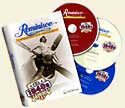##\keycode.boilerplatehtml##
Can't view the images? Click here to see them.
If you would like to change or edit your email preferences, please visit your Personal Preferences page.
 |
November • 2009 • NEWSLETTER |
##\keycode.leftcolumnhtml##
##\keycode.sidebarbookHTML## |
Dear ##firstname[Friend]##,
We hope you conjure up your own memories of times spent with grandmas, trips to the old movie house and the kindnesses of favorite teachers as you read through this month’s nostalgic stories. And for those who once lived without indoor bathroom facilities, the November poem is sure to give you a chuckle. As always, feel free to forward our newsletter on to a friend or family member. If this newsletter was forwarded to you and you’d like a monthly copy of your own, just use this link to sign up yourself. For now, get to reading. You want to have time later in the month for that pumpkin carving.—John Burlingham at Reminisce ##\keycode.pscopyhtml##
In this issue: To Grandmother’s House She Went … For Adventure
By Dorothy Thomas Looked at with adult eyes, I’m sure my grandmother’s old, gray Victorian home was very ugly, but my memory conjures up a lovely house in which the most marvelous things could happen. My grandmother, Emma Scott, lived just a short walk from the Illinois State Capitol in Springfield. There was never a better place to play hide-and-seek than a house with so many nooks, crannies and long velvet drapes for concealment. The staircase had a banister on each side, allowing two children to slide down at the same time—double the fun! Even practicing the piano wasn’t too terrible there because of the revolving piano stool. The kitchen might have been the most inconvenient one ever designed, with the sink at one end, the stove at the other and the icebox on the back porch. But who cared when there was a wonderful pantry with the perpetual aromas of vanilla and spices. The old black cook stove wasn’t used for preparing meals anymore, but it could warm the kitchen on an extra-cold day. The ceilings with varying designs of cherubs and flowers let imaginations wander all during nap time. Afterward, there was always the attic to be investigated. Then it was fun to head down the dark, curved back stairway to the old-fashioned cellar. There was something about the dank smell of the earthen floor and the dark, mysterious rooms that could send delicious shivers up and down a small child. Perhaps the best place of all was the wraparound porch with the big, wide swing. My first geology lesson was learned there from the fossils in the stone porch steps. I sometimes pass the site of Grandma’s house and still see the yellowed steps leading up to—nothing. The house was torn down years ago, shortly after my grandmother died, to make room for an apartment building that was never constructed. But I don’t really need to see the house, for I know that once there stood a beautiful Victorian home filled with childhood memories.The Infamous 3-D CaperBy Charles Herrmann There were five movie houses in the Germantown section of Philadelphia, Pennsylvania, during the time that our gang hung around the corner of Penn and Magnolia streets in the 1940s and ’50s. The large-balconied theaters included the Colonial on Germantown Avenue, which had an 8-cent matinee on Saturday featuring mostly cowboy movies. The much smaller Band Box on Armat Street played more artsy movies. We kids seldom went to the classy-looking Vernon Theatre on Germantown Avenue, since they played more mature material like dumb love stories. The Walton, on East Celton Avenue, was small and had an odd reputation of discriminating against Italians, who had to sit in the balcony. The huge and gorgeous Orpheum Theatre at Germantown and Chelten was the best, sporting a lobby with huge, round sitting benches and lacking a security system sufficiently strong enough to defend against we clever boys. In the back of the building was a spidery set of fire escapes that was easily reached from the ground by a 13-year-old. This allowed us an easy way to sneak in, hide from the usher’s flashlight and then sit up when the movie began. Better yet, the Orpheum was the first movie house to play a 3-D film, the curtains opening to reveal a wide, curved Cinemascope screen and giant, strategically placed speakers. Customers were given cardboard 3-D glasses as we took our seats, and the movie opened to applause, as was the custom in those days. Shortly after the movie began, the film ground to a halt, the floor lights came on and an usher appeared on stage. He apologized for the problem, explaining that every customer would get his or her 75 cents back by presenting either their 3-D glasses or their ticket stub at the box office. We were very disappointed as we walked out until seeing the sidewalk out front littered with ticket stubs. After a quick discussion, we each took several of the stubs to the box office and got multiple refunds! We then switched sweaters or hats, gathered more stubs and went back to the ticket office over and over until we either noticed a suspecting twitch in the cashier’s face or ran out of different clothing combinations. We each went home $6 to $8 richer, pulling our best con to date. That money brought me a lot of my beloved Hires root beer in the ensuing weeks. A Jewel of a TeacherBy Jack Francis My first-grade teacher, Carolina James, was typical of most schoolteachers I saw in the late 1930s—attractive, dark-haired, articulate, prim and proper in her appearance and of excellent bearing. I was awed by her. As our mentor at Thomas Sharp Elementary in West Collin, New Jersey, Miss James was as much a time management expert as those I’ve seen in the business world. In a single day, we were taught to read, write, add, subtract and spell, with periodic instruction in music and drawing. There was also recess and physical training, which focused on simple exercises and a round of “farmer in the dell.” For Miss James, it wasn’t enough for us to know how to spell a word; it was necessary for us to know why. We learned about vowels—their long and short sounds—and about consonants, too. We were drilled in the art of pronunciation, even though it was sometimes difficult for 6-year-olds to make certain sounds. To hold our interest, Miss James created stories about the spelling of words. As she put it, the word date was not pronounced that way by accident. The “e” came in at the beginning of the word, jumped over the “t” and took its place silently. The presence of the “e” gave the “a” its long sound. Because of Miss James’ ability to teach, I won all but one of the spelling bees in elementary school and have had no problem spelling since then. Music was another strong point. The fare was mostly Sousa marches played on a 78-rpm record player as we quick-stepped around the room holding a triangle or a tambourine. I always got the latter even though I wanted a triangle. Although it’s been 72 years, the march Semper Fidelis still reminds me of that classroom. Conduct and effort were two subjects on which we were graded. Conduct was almost a major subject, because if a teacher was forced to send a note home reporting bad conduct, the kid was really in trouble. In most families, a child’s misconduct was an embarrassment to the parents. Caroline James was a jewel. After completing college, I’d been a career Army officer for two years and had met a multitude of men from all walks of life when I realized how much her training meant to me. How lucky I was to have her as my first-grade teacher. Poem: The Passing of the PotElizabeth Bauer Edmund of Pensacola, Florida shares this entertaining poem by Eva Davis Penrose. As far back as childhood Beneath the bed ’twas anchored, Some called the critter “Peggy” To bring it in at evening Our big one was enormous When nights were dark and rainy At times when things were rushing Sometimes when in a hurry The special one for company Today this modernism Time Capsule TriviaFrom the decades spanning the 1920s to the 1960s, try to guess what year these historic events took place. Click the link below for the answer, but no peeking!
Click here for the answer to Time Capsule Trivia. A Thought to RememberPeople who sing their own praises usually sing solos. |
© Copyright 2009 Reiman Media Group, Inc.
This email was sent to: ##emailaddress##
HAVE A FRIEND who enjoys the good old days? Feel free to forward this newsletter! If this newsletter was forwarded to you, please use this link to sign up for yourself. If you do not want to receive further editions of this Newsletter, please use this link to unsubscribe.
To learn more about Reiman Media Group’s use of personal information, please read our Privacy Policy.

- Copyright 2009 Reiman Media Group, Inc. All rights reserved.
- 5400 S. 60th St., P.O. Box 991, Greendale WI 53129-0991
- 1-800/344-6913



